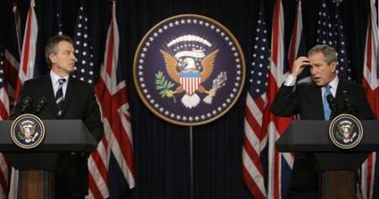Bush: "It's bad in Iraq. Does that help?"
 The Age
The AgeThe rhetoric of success in Iraq had not changed all that much, but a day after the report of the Iraq Study Group painted a dark and devastating picture of his Iraq venture, George Bush's body language spoke of something approaching defeat.
At a press conference with British Prime Minister Tony Blair, his closest ally, Mr Bush looked old, grey and diminished. There was an unreal quality to his determination to sound emphatic and confident that America could - had to - succeed in Iraq. Not win, mind you - the US President has stopped talking about victory - but succeed.
When Mr Bush said that the situation in Iraq was "unsettling", a British journalist asked why he seemed to still be in denial about how bad things were in Iraq and whether this denial meant he was not serious about major changes in Iraq policy. Mr Bush looked resigned rather than angry that he would so brazenly be accused by a journalist of denying what was obvious to virtually everyone.
"It's bad in Iraq. Does that help?" he said and then proceeded to talk of the families of fallen US soldiers whom he met regularly, his visits to US hospitals where he met wounded and maimed service men and women; the people who were, he said, making the sacrifices.
"I would not have our troops in harm's way if I did not believe it was important and if I did not believe we would succeed," he said. Link






<< Home